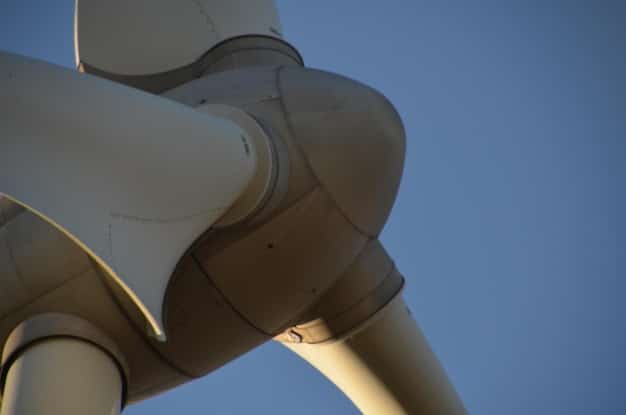Sustainable Tech: Innovations Driving US Environmental Responsibility

Sustainable tech in the US encompasses innovative technologies and practices designed to minimize environmental impact, promote resource efficiency, and foster a circular economy, addressing critical environmental challenges.
The United States is witnessing a surge in sustainable tech: innovations driving environmental responsibility in the US are becoming increasingly critical as we grapple with climate change and resource depletion. This article explores the cutting-edge technologies and strategies that are paving the way for a greener, more sustainable future in the US.
Sustainable Tech: Revolutionizing Energy Production
The energy sector is undergoing a radical transformation with the rise of sustainable technologies. These innovations are essential for reducing our reliance on fossil fuels and mitigating the harmful effects of climate change. Let’s delve into some key aspects of this revolution.
Solar Energy Advancements
Solar energy has made significant strides in recent years, becoming more efficient and accessible. Innovations are constantly improving solar panel technology, making it a viable alternative to traditional energy sources.
Wind Power Innovations
Wind power is another crucial component of sustainable energy production. New designs and technologies are enhancing the efficiency and reliability of wind turbines, allowing them to generate more power with less environmental impact.
- Improved turbine designs for greater energy capture
- Advanced materials for lighter and more durable blades
- Smart grid integration for efficient distribution of wind power

These advancements in solar and wind energy are crucial for establishing a sustainable energy infrastructure in the US. By embracing these technologies, we can significantly reduce our carbon footprint and move towards a cleaner, more sustainable future.
The Rise of Electric Vehicles and Sustainable Transportation
Transportation is a major contributor to greenhouse gas emissions, but electric vehicles (EVs) are changing the game. The adoption of EVs and other sustainable transportation methods is growing, driven by technological advancements and increasing environmental awareness. Here’s a closer look.
Electric vehicles are becoming more affordable and practical for everyday use. The development of better batteries and charging infrastructure is making EVs a compelling alternative to gasoline-powered cars.
Sustainable Public Transportation
Investing in sustainable public transportation is another important step towards reducing emissions. Electric buses, trains, and other forms of public transit can significantly lower the carbon footprint of urban areas.
- Electric buses with zero tailpipe emissions
- High-speed electric trains for efficient intercity travel
- Bike-sharing programs to encourage cycling
The shift towards electric vehicles and sustainable transportation methods is vital for creating a cleaner and healthier environment. By embracing these technologies, we can pave the way for a more sustainable future.
Smart Grids: Enhancing Energy Efficiency and Reliability
Smart grids are revolutionizing the way we manage and distribute energy. These advanced systems use digital technology to optimize energy use and improve the reliability of the power grid. Let’s explore the key benefits of smart grids.
Optimizing Energy Distribution
Smart grids can monitor energy consumption in real-time and adjust distribution accordingly. This optimization helps to reduce waste and ensure that energy is used efficiently.
Improving Grid Reliability
Smart grids can detect and respond to disruptions in the power grid, preventing outages and improving overall reliability. This is especially important during extreme weather events.
Smart grids are essential for creating a more sustainable and resilient energy infrastructure. By leveraging digital technology, we can make our energy systems more efficient and reliable, benefiting both the environment and consumers.

Sustainable Agriculture: Innovations for Food Production
Agriculture plays a significant role in environmental sustainability. Sustainable agriculture technologies and practices are aimed at reducing the environmental impact of food production while ensuring food security. Here’s how.
Precision Farming Techniques
Precision farming uses data and technology to optimize crop yields while minimizing resource use. This approach helps farmers to use water, fertilizers, and pesticides more efficiently.
Vertical Farming Systems
Vertical farming involves growing crops in vertically stacked layers, often indoors. This method can significantly increase crop yields while reducing the need for land and water.
- Hydroponics for efficient water use
- LED lighting to optimize plant growth
- Closed-loop systems to recycle resources
Sustainable agriculture is crucial for ensuring food security while protecting the environment. By adopting these innovative technologies and practices, we can create a more sustainable food system for future generations.
Waste Management and Recycling Technologies
Effective waste management and recycling are essential for reducing pollution and conserving resources. Innovative technologies are transforming the way we handle waste, making it more efficient and sustainable. Let’s discuss the key aspects.
Advanced Recycling Processes
Advanced recycling technologies can break down complex materials into their basic components, allowing them to be reused in new products. This process reduces the need for virgin materials and lowers carbon emissions.
Waste-to-Energy Conversion
Waste-to-energy plants convert non-recyclable waste into electricity or heat. This process reduces landfill waste and provides a source of renewable energy.
By improving waste management and recycling processes, we can significantly reduce pollution and conserve valuable resources. These technologies are vital for creating a circular economy and promoting environmental sustainability.
Water Conservation Technologies for a Sustainable Future
Water is a precious resource, and water conservation technologies are essential for ensuring its sustainable use. These innovations help to reduce water waste and improve water efficiency in various sectors. Here are a few.
Smart Irrigation Systems
Smart irrigation systems use sensors and data to optimize water use in agriculture and landscaping. These systems can reduce water waste and improve crop yields.
Water Recycling and Reuse Technologies
Water recycling and reuse technologies treat wastewater and reuse it for non-potable purposes, such as irrigation and industrial cooling. This approach helps to conserve freshwater resources.
- Greywater systems for residential use
- Industrial water recycling for manufacturing processes
- Rainwater harvesting for landscaping
Conserving water is crucial for ensuring a sustainable future. By implementing these innovative water conservation technologies, we can protect this vital resource and promote environmental sustainability.
| Key Point | Brief Description |
|---|---|
| ☀️ Solar Energy | Advancements in solar panel technology are making it more efficient and accessible. |
| 🚗 Electric Vehicles | EV adoption is growing due to technological advancements and eco-awareness. |
| ♻️ Waste Management | Innovative tech transforms waste handling, making it more efficient and sustainable. |
| 💧 Water Conservation | Technologies reduce water waste and improve efficiency in agriculture and landscaping. |
Frequently Asked Questions
▼
Sustainable tech includes innovations designed to minimize environmental impact and promote resource efficiency, such as renewable energy and waste management technologies.
▼
Electric vehicles reduce greenhouse gas emissions and reliance on fossil fuels, contributing to cleaner air and a more sustainable transportation system.
▼
Precision farming uses data and technology to optimize crop yields, reducing water and fertilizer usage and minimizing environmental impact in agriculture.
▼
Smart grids use digital technology to monitor real-time energy consumption, optimizing distribution and reducing waste, ultimately improving grid reliability.
▼
Waste-to-energy technologies convert non-recyclable waste into electricity or heat, reducing landfill waste and offering a renewable energy source.
Conclusion
Sustainable tech: innovations driving environmental responsibility in the US are transforming industries and offering viable solutions to pressing environmental challenges. From renewable energy and electric vehicles to smart grids and sustainable agriculture, these technologies are paving the way for a cleaner, more sustainable future for the United States.





